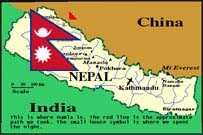Nepal parties in final election campaign ahead of the vote
 Kathmandu - Nepal's political parties Monday held rallies and election assemblies across the Himalayan nation hours before a ban on campaigning comes into effect in the run-up to polling day.
Kathmandu - Nepal's political parties Monday held rallies and election assemblies across the Himalayan nation hours before a ban on campaigning comes into effect in the run-up to polling day.
Under Nepalese election law, political parties must stop campaigning and remove their party flags and posters near polling centres 48 hours ahead of election day.
The ban on campaigning comes into effect midnight Monday. Nepal goes to the polls on Thursday.
Three of Nepal's biggest parties, along with pro-monarchy parties and regional groups, made last-minute speeches to sway voters.
Addressing a gathering of the Nepali Congress party in Kathmandu constituency number one, the party's vice-president, Prakash Man Singh, called on people to vote for his party.
"Nepali Congress has led every movement to overthrow autocratic regimes in Nepal and with such a history, only Nepali Congress can lead the constituent assembly to draft a new constitution," Singh told a gathering of about 1,000 people.
In a different part of the city, the moderate Communist Party of Nepal-Unified Marxist Leninist candidate claimed his party was best suited to lead the assembly.
"Old leaders and parties are like old cars on the street which we cannot depend on to reach our destination," youth leader Yogesh Bhattarai said, hinting at the ageing Nepalese Prime Minister Girija Prasad Koirala and his Nepali Congress Party.
"Old leaders cannot lead the country any more to meet the aspirations of the people."
The Maoists had their own campaign in different parts of the city. It included a motorcycle rally calling for the establishment of a "democratic republic."
In a surprise move, the monarchist Rashtriya Prajatantra Party- Nepal held a rally attended by nearly 600 people in downtown Kathmandu.
The supporters called for the reinstatement of Hinduism as the official religion and a constitutional monarchy.
Security has been tightened across the country ahead of polling with frequent police patrols and body searches of motorists and motorcyclists especially during the night.
According to the United Nations Mission in Nepal, at least seven people have died in election-related violence.
Thursday's vote to choose a constituent assembly is a key part of the peace agreement between the government and the former Maoist rebels that ended the decade-long communist insurgency.
The elections will be the first real democratic exercise in nearly nine years.
(dpa)